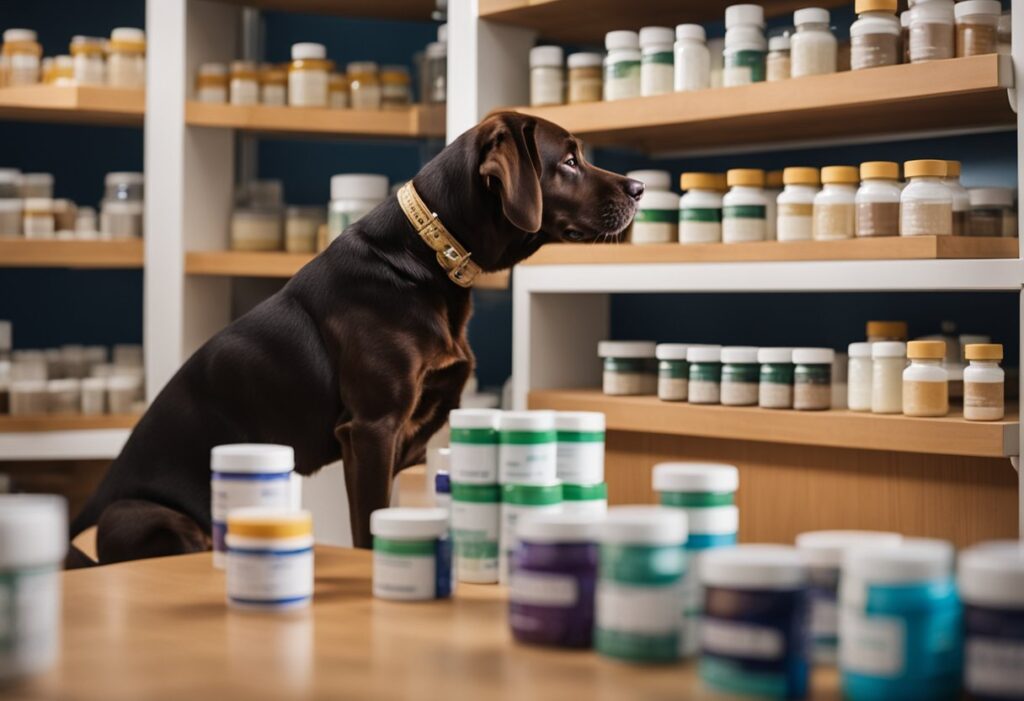Do Dogs Need Probiotics? Unveiling the Truth About Canine Digestive Health
When it comes to the health and wellbeing of your furry companion, you might wonder if incorporating probiotics into their diet is necessary. Probiotics, which are beneficial bacteria that reside in the digestive tract, are known to play a crucial role in maintaining gut health in humans. Similarly, for dogs, these good bacteria can contribute to a balanced gut flora, supporting digestion and potentially boosting the immune system.
Understanding the needs of your dog is essential, especially when considering dietary supplements like probiotics. While some dogs might benefit from them, particularly if they have digestive issues or after a course of antibiotics, others with a stable gut ecosystem may not need additional supplementation. It is important to assess your dog’s health and any symptoms they may be exhibiting before deciding to add probiotics to their routine.
Regular vet visits and observations of your dog’s general demeanor and bowel movements can provide insights into their digestive health. If you notice irregularities or changes that concern you, it might be an indication to explore probiotic supplements. However, before introducing any new elements to your dog’s diet, it is always advisable to consult with a veterinarian who can provide personalized advice based on your dog’s unique health profile.
Understanding Probiotics and Canine Health

In the pursuit of optimal health for your dog, probiotics emerge as key players in maintaining a balanced digestive system and supporting the immune response. These beneficial microorganisms work tirelessly in the gastrointestinal tract to ensure your dog’s overall well-being.
The Role of Probiotics in Digestion
Probiotics are live microorganisms, good bacteria, that confer a health benefit when administered in appropriate amounts. They are instrumental in your dog’s digestive health, aiding in the breakdown of food, absorption of nutrients, and production of short-chain fatty acids which are vital for colon health. Regular intake of probiotics can also help maintain a balanced gut flora, thwarting the overgrowth of bad bacteria which could potentially lead to digestive disturbances.
Probiotics vs. Prebiotics: What’s the Difference?
Probiotics and prebiotics may sound similar, but they have distinct roles in your dog’s health. Probiotics, as previously mentioned, are live beneficial bacteria like Lactobacillus species and Bifidobacteria. Prebiotics, on the other hand, are a form of fiber. They act as food for probiotics and support their growth. Prebiotics are found in foods like chicory root, garlic, and bananas. Together, they work symbiotically to support the fermentation processes in the gut that are essential for maintaining a healthy microbiome.
Immune System Benefits and Probiotic Mechanisms
Probiotics support the immune system by enhancing the gut’s mucosal immune response and barrier function. This not only helps in protecting against pathogens but also aids in the development of immunity. The presence of probiotics in the gut stimulates the production of immunoglobulin, cells, and cytokines, which are important components of your dog’s immune response. A well-maintained balance of gut flora has been tied to improved immunity and overall health, making the role of probiotics in your dog’s diet potentially very beneficial.
Common Health Issues Addressed by Probiotics
Probiotics play a critical role in maintaining your dog’s health by targeting several issues, particularly those involving the gastrointestinal system and immune responses. With their ability to balance gut flora, they are a key factor in tackling digestive problems and enhancing overall well-being.
Alleviating Gastrointestinal Problems
Your dog could experience a range of digestive issues, such as diarrhea, gas, and stomach cramping. Probiotics are beneficial in restoring the balance of harmful and beneficial bacteria in the gut, which is often disrupted during stress or illness. They can also help manage gastrointestinal upset resulting from antibiotics use by replenishing the gut’s good bacteria.
Information about the effectiveness of probiotics for diarrhea and gastrointestinal problems can be found through Cornell University College of Veterinary Medicine’s insights.
Combatting Infections and Bad Breath
Bad breath in dogs may signal an underlying infection or imbalance in the mouth’s bacterial population. Probiotics can outcompete harmful bacteria, potentially improving oral health and reducing bad breath. Additionally, they may offer defense against urinary and gastrointestinal infections, creating a barrier against pathogens and boosting the immune system.
To understand more about how probiotics influence infections and dental health, explore the relationship highlighted by Dog Food Advisor’s article.
Impact on Allergies and Skin Issues
Allergies and skin issues in dogs often stem from inflammation and an imbalanced immune response. Probiotics may improve the health of your dog’s skin by modulating the immune system and reducing inflammatory responses. Regular intake of probiotics can support the management of allergies and promote healthier skin.
I have noticed with my dogs that their allergies have been much better since I started giving them probiotics.
For insights into probiotics’ role in managing allergies and associated skin problems, consider the information provided by Vet Explains Pets.
Choosing the Right Probiotic Supplements for Dogs

When selecting probiotic supplements for your dog, it’s essential to choose the right type, look for beneficial strains and ingredients, and understand label information, such as live cultures count and expiration date.
Types of Probiotic Supplements: Powders, Capsules, Chews
Powders: These can be easily mixed into your dog’s food, ensuring they receive the supplement with their regular diet. It’s a versatile choice particularly appropriate for dogs with diet sensitivities.
Capsules: If you prefer a no-fuss approach, capsules may be ideal. They can be hidden in meals or treats, yet check if they need to be ingested whole to be effective. I use capsules but sprinkle it on my dog’s food.
Chews: Dog chews are a tastier option and may contain other nutrients or digestive enzymes that benefit your dog’s health. However, watch out for artificial sweeteners and preservatives.
Important Strains and Ingredients to Look For
- Lactobacillus acidophilus: A crucial bacteria for balancing gut health.
- Enterococcus faecium and Bacillus coagulans: Known to aid digestion and immune system function.
- Bifidobacterium strains such as bifidobacterium lactis, bifidobacterium breve, and bifidobacterium animalis: Help to maintain a healthy gut flora.
Other important ingredients to consider include prebiotics, which serve as food for probiotics, promoting their growth and activity within the digestive system.
Understanding Labels: Expiration Date, CFUs, and Additives
Always check the expiration date to ensure potency. The label should also list CFUs (colony-forming units), indicating the level of live probiotic bacteria in the supplement. High CFU counts could be more beneficial, depending on the strains included. Also, assess the moisture content, as excessive moisture can reduce the lifespan of the probiotics. Lastly, avoid unnecessary additives, opting for supplements that steer clear of ingredients that don’t serve a functional purpose for your dog’s health.
Incorporating Probiotics into Your Dog’s Diet
Probiotics are live microorganisms that can provide health benefits when consumed in appropriate amounts. Including them in your dog’s diet can support digestive health and promote beneficial gut bacteria. Here’s how you can add them to your dog’s nutrition regimen.
First, it’s essential to choose the right dog foods that contain probiotics or add them separately. Opt for high-quality, commercially-available dog foods that list probiotics on their ingredient label. Alternatively, you can incorporate natural sources of probiotics like yogurt or kefir. These dairy products are well-known for their live cultures and can be beneficial in the right quantities:
- Small dogs: 1 teaspoon per day
- Medium-sized dogs: 2 teaspoons per day
- Large dogs: 3 teaspoons per day
In addition to dairy, certain vegetables are excellent sources of prebiotics, which act as food for probiotics. Vegetables like carrots and sweet potatoes are rich in fiber and help promote a healthy gut environment.
Here’s a simple guideline for serving sizes:
| Size of Dog | Yogurt/Kefir | High-Fiber Vegetables |
|---|---|---|
| Small | 1 teaspoon/day | 1/4 cup/day |
| Medium | 2 teaspoons/day | 1/2 cup/day |
| Large | 3 teaspoons/day | 3/4 cup/day |
Remember, before making any dietary changes, consult your veterinarian, especially if your dog has specific health concerns. Start with small quantities to ensure your pet reacts well and increase gradually as needed. Balancing probiotics and fiber in your dog’s diet is a step toward maintaining their overall health.
Consulting with Veterinarians for Best Practices
When considering probiotics for your dog, a veterinarian’s expertise is indispensable. They will take into account your dog’s unique health profile to recommend the most suitable approach to using probiotics for enhancing their wellness.
Evaluating Individual Needs and Conditions
Nutrition and wellness are closely linked in dogs, and gut health plays an important part. Probiotics introduce beneficial, gut-dwelling microbes that can aid digestion and immune health. However, it’s vital to understand that each dog is different. Age, stress levels, illness, and underlying sensitive stomachs can all influence the need for canine probiotics. Your veterinarian will evaluate factors like your dog’s age—old age could mean a different probiotic requirement compared to a younger dog—as well as any medications or antibiotic use that might affect their gut flora.
Monitoring Responses and Adjusting Diets
After starting a probiotic regimen, monitoring responses is crucial for assessing efficacy. Your veterinarian can govern this regulation with follow-up consultations to observe results and make necessary dietary changes if adverse reactions occur. This is especially vital if your dog is on any medication that could interact with the probiotics or if they have particular health conditions that require tailored nutrition solutions. Keep a close watch for any behavioral changes or signs of gastrointestinal discomfort which might indicate a need to adjust the probiotic treatment.
Frequently Asked Questions
In addressing the health of your canine companion, you might have questions about the role of probiotics. This section aims to answer some common inquiries regarding probiotic use in dogs.
What are the signs indicating my dog may need probiotics?
If your dog is experiencing digestive upset such as diarrhea, constipation, or excessive gas, it might be a sign that their gut flora is imbalanced. Probiotics can help restore the beneficial bacteria in your dog’s intestinal tract.
Can I safely provide homemade probiotics to my dog?
Yes, you can provide homemade probiotics such as kefir or yogurt in small quantities. However, it’s essential to ensure that these foods do not contain xylitol or artificial sweeteners, which can be toxic to dogs.
What are the benefits of probiotics for dogs with diarrhea?
Probiotics can aid dogs with diarrhea by replenishing healthy gut bacteria, which can help to stabilize the digestive system and improve stool quality.
Which probiotics are considered best for canine health?
There are several probiotics marketed for dogs, and the best dog probiotics often contain strains like Enterococcus faecium and Bacillus coagulans. It’s recommended to choose a product specifically designed for dogs and backed by good reviews and veterinary recommendations.
Is it safe to give dogs probiotics designed for human consumption?
Probiotics designed for human consumption are not always suitable for dogs. It’s usually safer to use products formulated for canine needs to ensure the right strains and dosage.
Are there any potential side effects associated with giving my dog probiotics?
While probiotics are generally safe, some dogs may experience side effects such as bloating, gas, or changes in appetite. If your dog shows adverse reactions, consult your veterinarian.





Recent Comments